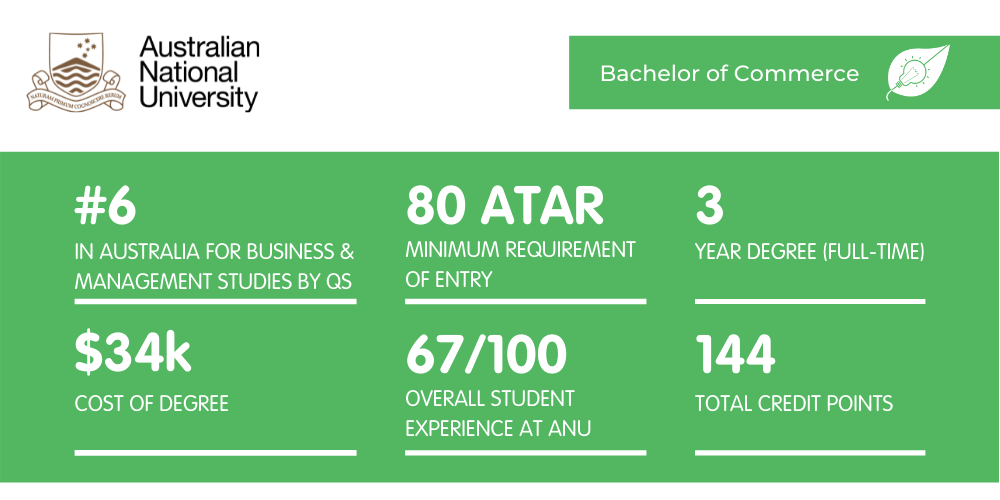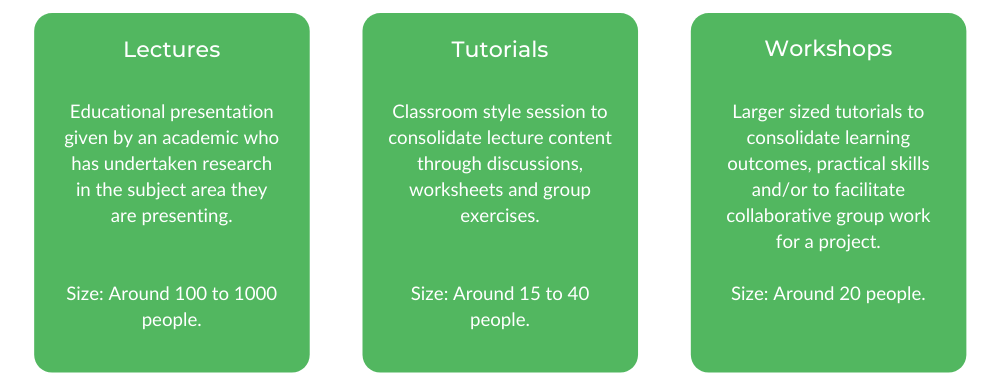Savvy in your business studies? Or, are you fascinated by economics? Whatever your passion, a Bachelor of Commerce at ANU offers a kickstart to a future in the national and global business.
This article goes through the ins-and-outs of the degree, from the core units, the classes you’ll take to the societies you should look into.
Keep reading on if you’re keen to know more!
What is a Bachelor of Commerce at ANU?
Core Units and Majors
How to Get into a Bachelor of Commerce at ANU
What’s the Teaching Format?
What’s the Faculty and Culture Like?
What is a Bachelor of Commerce at ANU?
A Bachelor of Commerce at ANU provides a flexible way to study business. In the three years of study, the course program makes a lot of space for studying your major and the electives you’d like to niche into.
Apart from your first year, you’ll be focussing heavily on one of the eight majors offered by the university. Given the long-standing prestige of ANU, the course has incredible connections with private-sector and public sector organisations, in which you’ll come across opportunities for experience and jobs in your electives!
Can this degree be studied in conjunction with another or completed as Honours?
While a Bachelor of Commerce can be studied on its own, ANU’s flexible degree “builder” offers a vast range of double degree options. Popular pairings with a Bachelor of Commerce include a Bachelor of Arts or a Bachelor of Politics, Philosophy and Economics (find full list here).
In addition, you can continue and study an additional two-semester Honours program, so long as you have passed all your units.
Career Paths
Though it heavily depends on your major, you can graduate with a variety of career options in the business field. These include:
- Business risk analyst
- Auditor
- Consultant
- Systems analyst
- Marketing coordinator
- Business development manager
Core Units and Majors
What are the Core Units?
There are only five core units in a Bachelor of Commerce at ANU. These are studied in the first two semesters of your degree and are:
- Business Reporting and Analysis
- Microeconomics 1
- Communication for Business
- Macroeconomics 1
- Quantitative Research Methods
These units foreground your knowledge to the more advanced units by contextualising the business environment.
Microeconomics 1 explores market activity from the perspective of individuals and firms, while Macroeconomics 1 examines the operation of the economy as a whole. Here, you’ll use the basic economic theories and macroeconomic models, such as the Solow growth model and the AS/AD-model, to make sense of how the economy works.
The units Business Reporting and Analysis, Communication for Business and Quantitative Research Methods introduce skills that are required for any business major. Here, you’ll learn to write up various business reports, understand basic terminology and analyse quantitative information.
Majors
In your second and third year, you’ll specialise into one of the eight majors you can choose from. They are:
- Accounting
- Business Information Systems
- Corporate Sustainability
- Economic Studies
- Finance
- International Business
- Management
- Marketing
The majors mix traditional and newer business interests. For example, in an Accounting major, you’ll learn from the long line of accounting procedures required in the analysis, reporting and evaluation of business information.
Whereas, in a Corporate Sustainability major, you’ll look into a multidisciplinary approach of how to create long-term business value in light of current social issues.
However, if you want accreditation for certain majors (such as in an Accounting major), you’ll have to find and enrol in the required units by asking the relevant professional bodies yourself.
Work Experience
While there are no mandatory work placements, there are a bunch of exciting opportunities offered in the electives.
For example, the units, ANU College of Business and Economics Internship Program (UG) and Social Enterprise Experience, offer work experience with ANU’s industry partners. The unit, Social Enterprise Experience, is even completed overseas!
How to Get into a Bachelor of Commerce at ANU
The ATAR cut off for this program is 80.00. The ANU Adjustment factors scheme offers up to 10 adjustment factors for applicants who have the following achievements (the number of adjustment points can be found here):
- Band 5 in Chemistry
- Band 5 in English (except ESL) or Languages (other than English) or Indigenous Studies
- E3 in Specialist mathematics (major/minor or double major)
- Band 5 in Physics
- Successful Completion in Music AMEB Grade 8
Though there are little alternate pathways for entry, you can internally transfer from another degree such as a Bachelor of Arts.
Assumed Knowledge
The assumed knowledge for this course is Mathematics. However, there are no pre-requisite subjects or additional assessments required for entry.
Scholarships
To aid with tuition and study costs, ANU provides a variety of scholarships for its students.
For example, the ANU College of Business & Economics Community Engagement Award offers a lump-sum of $1000 for a student in the ANU Business & Economics School who proves their academic merit.
In addition, the Australian Excellence Scholarship offers a stipend of $12,500 per annum for up to 5 years for the top three applicants in their state or territory (based on their ANU selection rank/ATAR).
What’s the Teaching Format?
A Bachelor of Commerce at ANU is taught in semesters. Typically, units will have 2 hours of lectures a week, and one hour of tutorials and possibly a one-hour workshop — however, this will vary depending on the learning outcomes of the unit.
Class Structure
Lectures
Lectures typically cover course content for the week, where the lecturer expands on their notes and provides further explanation on textbook content.
Core units such as Microeconomics and Macroeconomics that are compulsory to complete tend to have larger cohorts of around 800 to 1000 students. However, these tend to drop to around 100 to 200 when you attend your major units.
Tutorials
In tutorials, students often explore a set of tutorial questions that you should complete before attending the tutorial. It is common for tutorials to contain short, 10-minute quizzes on content learnt from the previous week.
Tutors also summarise the content learnt from the previous week, and go over solutions for the tutorial questions. This is the prime time to ask for further explanation on tutorial solutions or lecture content.
In your core units, you’ll tend to have larger tutorial sizes with around 30 to 40 students per tutorial. As you progress through your degree and complete major/minor courses, cohort size tends to decrease to around 15 to 20 people per tutorial.
Workshops
Some courses that have more technical elements, such as statistics or finance, may also have a workshop each week. Workshops generally cover harder, exam-style questions, where lecturers will explain solutions to the questions that are optional to complete before class.
Workshops tend to have a cohort size of around 20 people.
How much time do you spend in class?
If you are studying the typical four units per semester, you generally will spend 12-16 hours attending classes each week. However, this number varies depending on the units you are completing and the types of classes they have.
What are the assessments like?
The main assessments for a Bachelor of Commerce at ANU include weekly quizzes, exams, and group assignments.
Units typically have a series of quizzes throughout the semester, which are either taken in tutorials or an online format. These often weigh 10-15% of the unit grade in total.
During the middle of the semester, there is often an exam that reviews the earlier weeks of content. These will weigh between 30-40% of your final mark. However, some units will have group assignments instead of a mid-semester exam or quizzes.
Most Commerce units will have a final exam, where students consolidate all the unit’s content to various question formats such as short answers, quantitative analysis or hypothetical situations. These exams are usually weighted 40-50% of your final mark.
Skills You Refine and Learn
From a Bachelor of Commerce at ANU, the technical, communication and critical-thinking skills you’ll develop are based on your chosen major.
Technical skills encompass the content material you’ve learned across the three years, which include the techniques and theoretical knowledge in the major. For example, in a Finance major, you’ll learn to analyse statistical data, through working with the software R Studio as well as computing and graphical methods.
Communication is, no doubt, fundamental to any Commerce major. As you’ll have to demonstrate your knowledge, business solutions and analysis to various people in your career, this skill is developed through group assignments, class discussion and exams throughout the course.
Lastly, Commerce students sharpen their critical-thinking skills through examining real-world business problems and coming up with solutions. These are both discussed in class and assessed in their exams.
What’s the Faculty and Culture Like?
Faculty
The Commerce cohort at ANU is diverse and supportive, as most people hail from different cities in Australia or even countries. While the cohort is quite large, you often make friends through finding yourself doing the same units with the same people.
The teaching staff at the ANU College of Business and Economics are found to be generally approachable and supportive. Most have had incredible professional experience before entering academia, and are a great resource to learn more about career options after graduation!
The College of Business and Economics also has a wide range of great resources to help you plan your degree and career, gain internships, perfect your resumes and interview skills, as well as mentoring and networking events.
Culture
There are a number of great societies that are great to get involved in including the ANU Finance, Economics and Commerce Society (AFEC) and ANU Finance Society.
AFEC is catered generally for all students from the College of Business and Economics. They hold a large range of study-related events such as study groups and ‘hindsight’ tutorials, where later-year students offer tips on introductory units. There are also many social events scattered throughout the semester with frequent cocktail and trivia nights.
The ANU Finance Society, as the name suggests, is catered for students interested in finance. Their events are mostly career-related and include networking nights, finance trips to Sydney, interview workshops and info nights from large financing firms.
Mentorship
The CBE MomentuM Program is a mentoring program offered to Commerce students and other students from the College of Business and Economics. Each semester, students meet up with their assigned mentor who has typically three or more years of professional work experience and attend industry-related workshops.
There are five themes for these workshops, which are Leadership, Communication, Personal Brand & Career Development, Critical Thinking & Problem Solving and Teamwork.
Lynn Chen is a Content Writer at Art of Smart Education and is a Communication student at UTS with a major in Creative Writing. Lynn’s articles have been published in Vertigo, The Comma, and Shut Up and Go. In her spare time, she also writes poetry.






